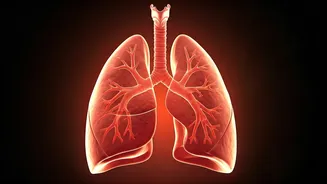Understanding Lung Health
Maintaining healthy lungs is crucial for overall well-being. Several factors can impact lung function, including environmental pollutants, infections,
and lifestyle choices. Breathing issues can lead to discomfort and affect daily activities. By adopting natural methods, individuals can actively work towards clearing congestion and fostering healthier lungs. It is essential to recognize the importance of proactive measures. Breathing is a fundamental life function, and supporting lung health is a proactive step toward maintaining optimal respiratory function. Simple, consistent practices can pave the way for a healthier respiratory system and enhanced quality of life. The implementation of natural remedies offers a practical way to manage and possibly reverse some of the impacts of poor respiratory health.
Postural Drainage Techniques
Postural drainage techniques represent a proven method for clearing mucus from the lungs. This method leverages gravity to assist in removing mucus buildup from various lung segments. Different body positions are utilized to help drain mucus, thereby easing breathing. The practice typically involves positioning oneself in specific angles. This process encourages the flow of mucus toward larger airways. In combination with other treatments, postural drainage can be an effective tool. When performed correctly, postural drainage can significantly aid individuals who have an overproduction of mucus. It is crucial to understand and properly execute the recommended postures for each affected area of the lungs. The consistency of using these methods can offer considerable relief and facilitate improved respiratory function. Consulting with a healthcare provider is suggested to learn the proper techniques and how to best tailor them to your specific needs.
Steam Therapy's Benefits
Steam therapy offers a natural way to open airways and loosen mucus. By inhaling warm, moist air, individuals can experience relief from congestion. The steam helps to thin the mucus. This process makes it easier to expel from the lungs. This method is easily accessible and can be performed at home. Steam therapy can be especially useful during cold and flu seasons. It’s important to practice steam therapy safely. The best way is to sit in a room with a running humidifier or lean over a bowl of hot water. Make sure to cover your head with a towel to trap the steam. Ensure the water is not scalding to prevent burns. Taking measured breaths while inhaling the steam is key. It helps in the reduction of congestion and promotes easier breathing. For those with respiratory conditions, this method can provide notable, gentle relief. Always be aware of your body's response, and stop immediately if you feel any discomfort or irritation.
Controlled Coughing Technique
Controlled coughing is a conscious method for clearing mucus from the lungs. Unlike forceful coughing, controlled coughing aims to efficiently expel mucus. This technique involves taking deep breaths, holding them, and then performing several gentle coughs. The method aids in dislodging mucus and clearing airways without excessive strain. It is important to exhale slowly through an open mouth. Then, repeat the coughs until mucus is cleared. Using this technique, it helps one to manage and control the cough's force and effect. For individuals experiencing respiratory issues, the controlled coughing technique is a beneficial skill. It can make a significant difference in respiratory wellness. By practicing controlled coughing, one can effectively and gently clear the lungs. Consult with a healthcare professional to master the technique and incorporate it into a lung health plan.
Dietary Strategies
Certain foods and drinks can support lung health and reduce inflammation. Antioxidant-rich foods, such as green tea and those abundant in vitamins, can help protect the lungs. Vitamin C has been shown to support the respiratory system. It can also help combat against infections and support lung function. Similarly, hydrating with plenty of water keeps the mucus thin, making it easier to expel. Also, incorporating anti-inflammatory foods into your diet, like ginger and turmeric, can help calm irritated airways. Avoiding processed foods, which may exacerbate inflammation, can also be beneficial. It is essential to choose a diet that fuels respiratory wellness. By making conscious dietary choices, individuals can support their lung health. The benefits include facilitating healthy breathing and contributing to overall well-being. Consulting a healthcare provider or a nutritionist will provide personalized dietary advice and is recommended.













